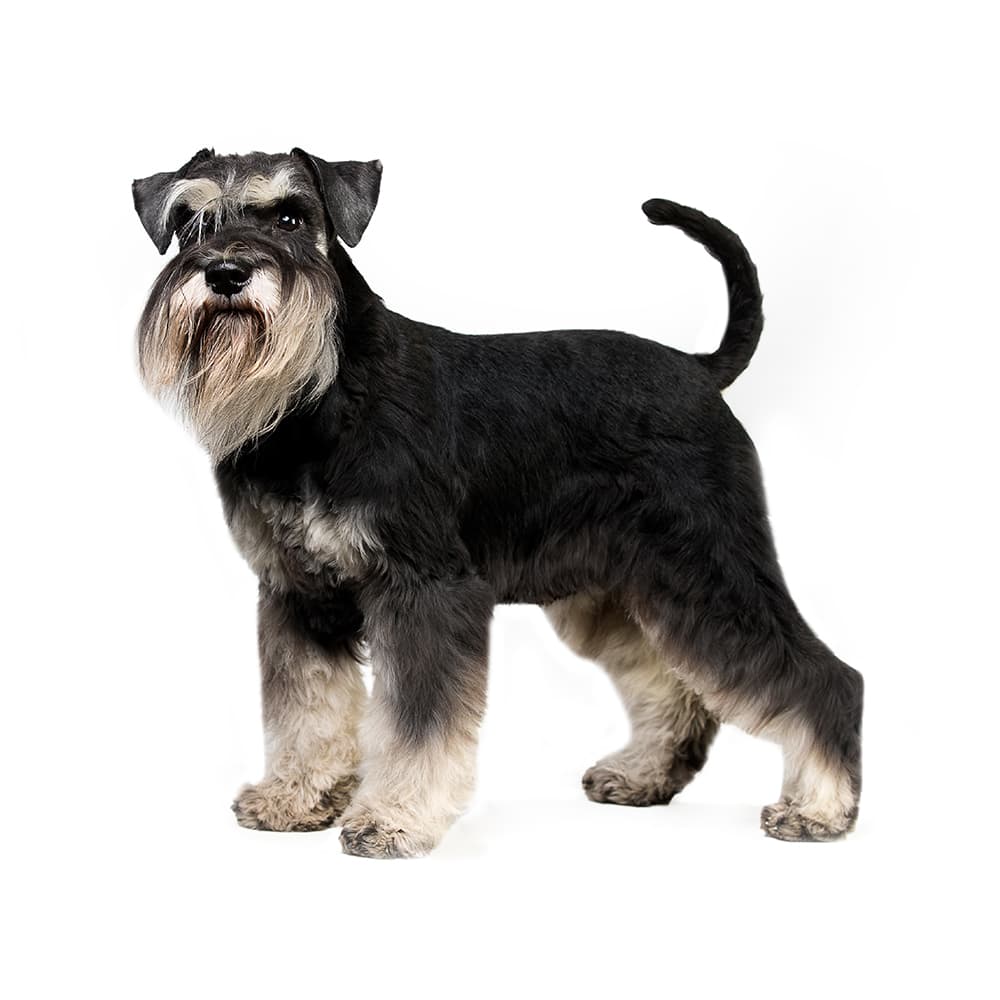Discover your dog's connection to this breed and 200+ others


Discover your dog's connection to this breed and 200+ others



The Miniature Schnauzer is a breed of small dog that originated in Germany in the mid-to-late 19th century. They were originally bred for their skills as versatile farm dogs, capable of ratting, herding, and guarding property. While the breed's exact origins aren't clear, it is generally accepted that the Miniature Schnauzer was developed from the Standard Schnauzer, along with smaller breeds like the Miniature Pinscher, Poodles, and possibly Affenpinschers. Today, they are a popular choice for pet owners due to their unique appearance and friendly, energetic personalities. Miniature Schnauzers have a double coat. The topcoat, or overcoat, is wiry and tight, while the undercoat is soft and dense. They are well known for their distinct "mane" of longer fur around the chest and neck, their bushy eyebrows, and a bristly, tufted beard.
Miniature Schnauzers are prone to eye disorders such as progressive retinal atrophy, retinal dysplasia, and cataracts. They can also suffer from can suffer from urinary stones, pancreatitis, liver shunts, hyperlipidemia, mycobacterium avium infection, urolithiasis, von Willebrand disease, Schnauzer Comedo Syndrome (also known as Schnauzer Bumps), myotonia congenita, and allergies. Genetic testing for other conditions affecting this breed include degenerative myelopathy, Persistent Müllerian Duct Syndrome, spondylocostal dysostosis, coagulation factor VII deficiency, and chondrodystrophy (with or without chondrodysplasia). As for all breeds, genetic screening is recommended to assist veterinarians with diagnosis and proactive care, as well as help breeders identify affected and carrier dogs.
Miniature Schnauzers are known for their friendly, intelligent, and energetic nature. They are typically very loyal to their families, and they are often good with children. Miniature Schnauzers are known to be vocal and can be somewhat territorial, which makes them excellent watchdogs. They're usually good with other dogs and pets, and they are trainable, but they have a bit of a stubborn streak. Due to their energy and intelligence, they require both physical and mental stimulation to stay happy.
A canine genetic lineage is a group of individuals or entire breeds that descended from common ancestors predating modern breed formation. Often these lineages are associated with a ‘type’ of dog with a unique historical working role and associated behaviors (e.g., herding, scent hunting, etc.).
Spitz and Sled Dogs originate in the Arctic and subarctic regions which caused them the develop adaptations to cold climates. Some of these adaptations give rise to characteristics of the lineage, most notably a dense double coat that helps with insulation. The lineage of these dogs can be followed back to ancient breeds developed by Indigenous people. These ancient breeds were used as an aid for transportation, herding, guarding, and hunting. These jobs have created dogs that are independent, intelligent and have strong work ethics as well as a sturdy body that helps them to pull sleds or go on long journeys over rough terrain.
Example breeds with ancestry from this lineage include Akita, Chow Chow, and Siberian Husky.
Miniature Schnauzers are the most popular of the three Schnauzer breeds, which also include the Standard Schnauzer and the Giant Schnauzer.
They are sometimes referred to as "Zwergschnauzer," which is German for "dwarf Schnauzer".
Despite their small size, they're known for their surprisingly loud and deep bark.
A unique aspect of the Miniature Schnauzer's coat is that it is hypoallergenic, meaning it's a good choice for people with allergies.
https://www.akc.org/dog-breeds/miniature-schnauzer/
https://www.ukcdogs.com/miniature-schnauzer
https://fci.be/en/nomenclature/MINIATURE-SCHNAUZER-183.html
https://www.petmd.com/dog/breeds/c_dg_miniature_schnauzer
https://www.pawprintgenetics.com/products/breeds/81/
Recommended by top vets with decades of experience
21 breeds
64 genetic health markers
50 genetic trait markers
